
Immanuel Kant was a German philosopher and one of the central Enlightenment thinkers. Born in Königsberg, Kant's comprehensive and systematic works in epistemology, metaphysics, ethics, and aesthetics have made him one of the most influential figures in modern Western philosophy.
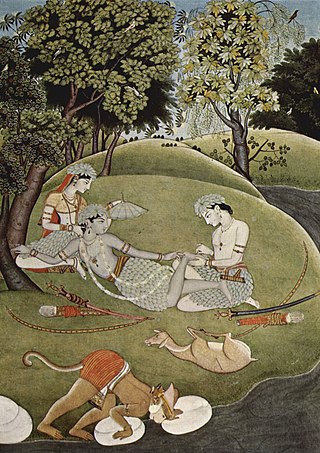
The Rāmāyana is a Sanskrit epic composed over a period of nearly a millennium, with scholars' estimates for the earliest stage of the text ranging from the 8th to 4th centuries BCE, and later stages extending up to the 3rd century CE. Ramayana is one of the two important epics of Hinduism, the other being the Mahābhārata.

Ravana is a rakshasa king of the island of Lanka, and the chief antagonist of the Hindu epic Ramayana and its adaptations. In the Ramayana, Ravana is described to be the eldest son of sage Vishrava and rakshasi Kaikesi. He abducted Prince Rama's wife Sita and took her to his kingdom of Lanka, where he held her in the Ashoka Vatika. Later, Rama, with the support of vanara King Sugriva and his army of vanaras, launched an invasion against Ravana in Lanka. Ravana was subsequently slain and Rama rescued his beloved wife Sita.
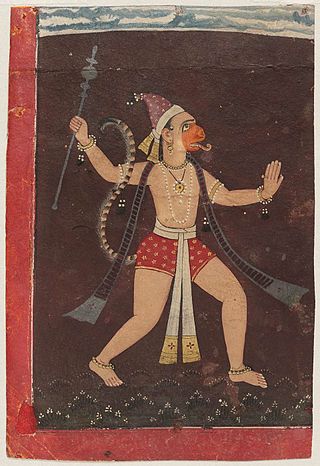
Hanuman, also called Anjaneya, is a Hindu god and a divine vanara companion of the god Rama. Hanuman is one of the central characters of the Hindu epic Ramayana. He is an ardent devotee of Rama and one of the Chiranjivis. Hanuman is regarded to be the son of the wind-god Vayu, who in several stories played a direct role in Hanuman's birth, and considered to be an incarnation or son of Shiva in Shaivism. Hanuman is mentioned in several other texts, such as the epic Mahabharata and the various Puranas.
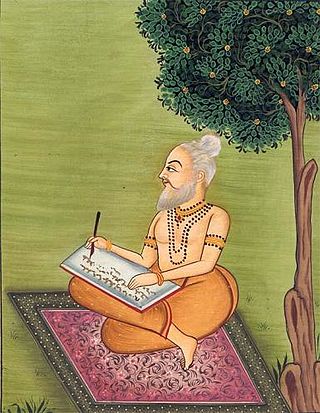
Valmiki is celebrated as the harbinger-poet in Sanskrit literature. The epic Ramayana, dated variously from the 5th century BCE to first century BCE, is attributed to him, based on the attribution in the text itself. He is revered as Ādi Kavi, the first poet, author of Ramayana, the first epic poem.
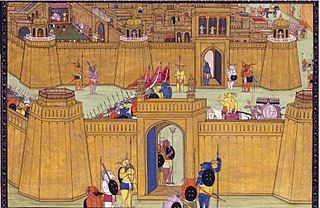
Lanka is the name given in Hindu epics to the island fortress capital of the legendary asura king Ravana in the epics of the Ramayana and the Mahabharata. The fortress was situated on a plateau between three mountain peaks known as the Trikuta Mountains. The ancient city of Lankapura is said to have been burnt down by Hanuman. After its king, Ravana was killed by Rama with the help of Ravana's brother Vibhishana, the latter was crowned king of Lankapura. His descendants were said to still rule the kingdom during the period of the Pandavas. According to the Mahabharata, the Pandava Sahadeva visited this kingdom during his southern military campaign for the rajasuya of Yudhishthira.
In moral philosophy, deontological ethics or deontology is the normative ethical theory that the morality of an action should be based on whether that action itself is right or wrong under a series of rules and principles, rather than based on the consequences of the action. It is sometimes described as duty-, obligation-, or rule-based ethics. Deontological ethics is commonly contrasted to consequentialism, virtue ethics, and pragmatic ethics. In this terminology, action is more important than the consequences.

Ernst Alfred Cassirer was a German philosopher. Trained within the Neo-Kantian Marburg School, he initially followed his mentor Hermann Cohen in attempting to supply an idealistic philosophy of science.
In philosophy, transcendence is the basic ground concept from the word's literal meaning, of climbing or going beyond, albeit with varying connotations in its different historical and cultural stages. It includes philosophies, systems, and approaches that describe the fundamental structures of being, not as an ontology, but as the framework of emergence and validation of knowledge of being. "Transcendental" is a word derived from the scholastic, designating the extra-categorical attributes of beings.

Kantian ethics refers to a deontological ethical theory developed by German philosopher Immanuel Kant that is based on the notion that: "It is impossible to think of anything at all in the world, or indeed even beyond it, that could be considered good without limitation except a good will." The theory was developed in the context of Enlightenment rationalism. It states that an action can only be moral if (i) it is motivated by a sense of duty and (ii) its maxim may be rationally willed a universal, objective law.

In Hinduism, an astra was a supernatural weapon, presided over by a specific deity and imbued with spiritual and occult powers that caused its effect or impact. Later the word came to denote any weapon which was used by releasing it from one's hand, compared to keeping it one's hand (Shastra). In Ramayana and Mahabharata, Rama had more astras than any other warrior. It is believed that Rama possessed all astras. Various texts have stated that Arjuna possessed almost all astras except Brahmandastra & Narayanastra.
Evangeline Anderson-Rajkumar is a feminist activist ecumenical theologian who taught at Serampore College, Serampore (1990-1994) the United Theological College, Bangalore, (1999-2014). Evangeline Anderson-Rajkumar was the first permanent woman faculty to serve as faculty in the Theology Department of the renowned Serampore College, founded by William Carey when he came to India in 1792. She was the first Lutheran Woman to serve as first Vice President of the United Evangelical Lutheran Churches in India in 2006. She comes from a family of theologians - about 17 of them, her father, all eight siblings, and seven of the eight who married into the family. Evangeline Anderson-Rajkumar served as the President of the Association of Theologically Trained Women of India (ATTWI) and is a sought after resource person on Body Theology.
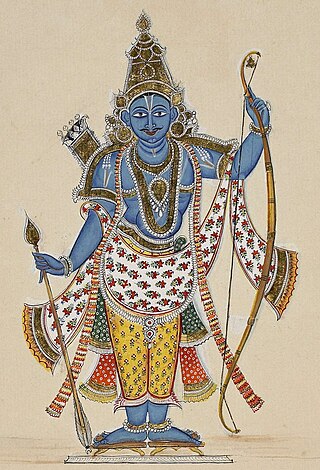
Rama is a major deity in Hinduism. He is the seventh and one of the most popular avatars of Vishnu. In Rama-centric traditions of Hinduism, he is considered the Supreme Being.

Kanchana Sita is a 1977 Indian Malayalam feature-length film scripted and directed by G. Aravindan. A mythological film, its story was adapted from C. N. Sreekantan Nair's play of the same name, which is a reworking of Valmiki's Ramayana.

Prof. Dr. Mathew Chandrankunnel CMI is a professor of philosophy of science at Dharmaram Vidya Kshetram and Christ University, both in Bangalore, India. He is the author of several books including "Philosophy of Quantum mechanics" and "Ascent to Truth: The Physics, philosophy and Religion of Galileo Galilei". He is a scientist, philosopher and theologian.
Transcendental Humanism in philosophy considers humans as simultaneously the originator of meaning, and subject to a larger ultimate truth that exists beyond the human realm (transcendence). The philosophy suggests that the humanistic approach is guided by “accuracy, truth, discovery, and objectivity” that transcends or exists apart from subjectivity.
Jabali is a character in the ancient Indian epic Ramayana. A learned man and an advisor of King Dasharatha, he unsuccessfully tries to persuade Rama to give up his exile, using rational arguments.

Barbara Herman is the Griffin Professor of Philosophy and Professor of Law at the University of California, Los Angeles Department of Philosophy. A well-known interpreter of Kant's ethics, Herman works on moral philosophy, the history of ethics, and social and political philosophy. Among her many honors and awards include a Guggenheim Fellowship (1985-1986) and election to the American Academy of Arts & Sciences (1995).
The National Council of Hindu Temples (NCHTUK) is an umbrella body of Hindu temples (mandirs) in the United Kingdom. It connects a network of over 200 temples in the country. It supports the temples, their management, employees and operations in order to enable public access to some of the oldest heritage sites of Hinduism. NCHTUK is also involved in areas of interfaith dialogue at forums like The Interfaith Network UK.
Rāmāyana is one of the two major Sanskrit epics of ancient India and important text of Hinduism, the other being the Mahābhārata.













